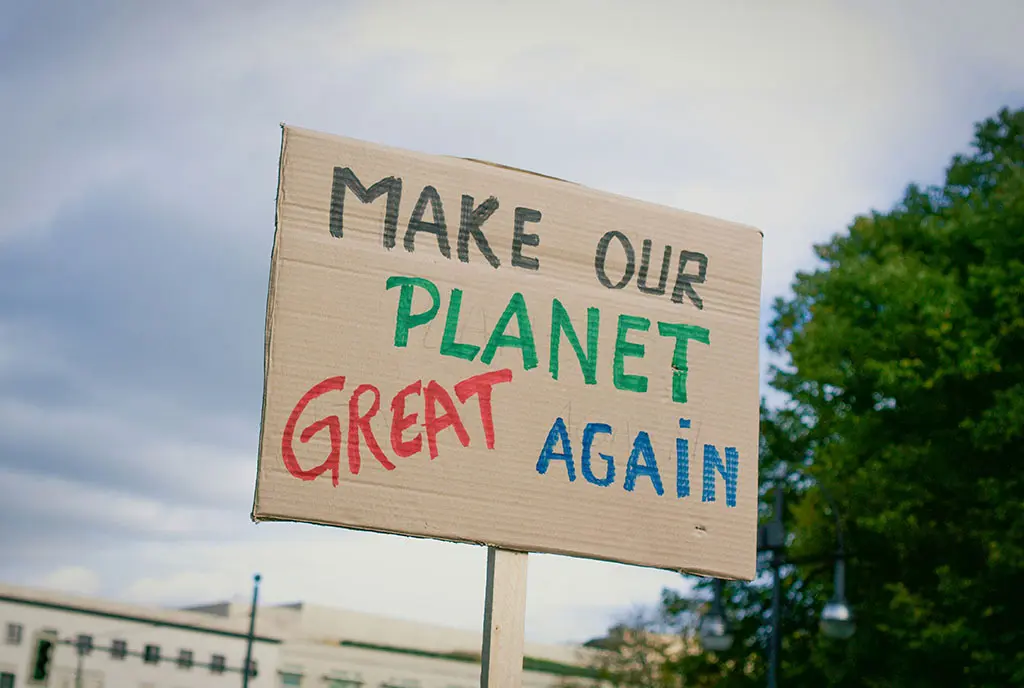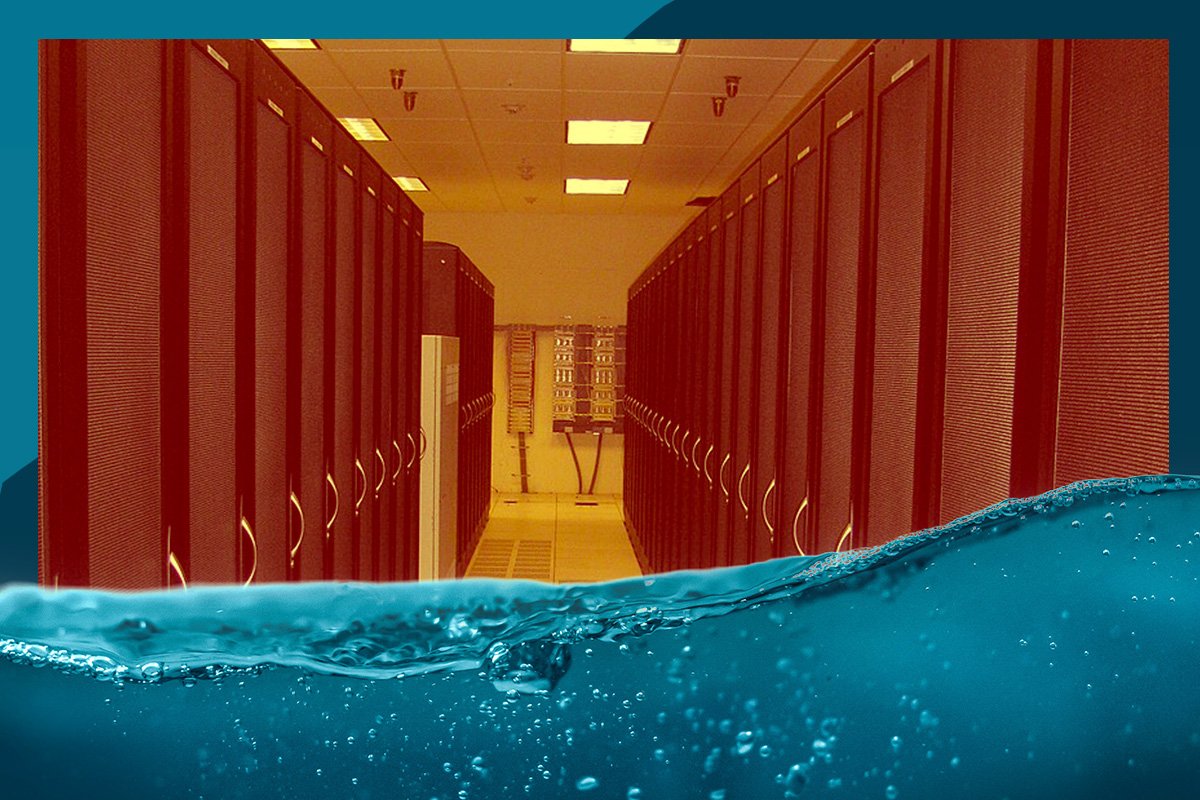
During the first presidency of Donald Trump, who called green energy a “scam,” the United States fell dramatically behind in efforts to repair the climate while ramping up emissions and pollution.
The Trump administration rolled back or dismantled more than 100 rules designed to protect the environment, which led to an estimated thousands of preventable deaths from illnesses related to air pollution. As Hana V. Vizcarra, a staff attorney at Harvard’s Environmental and Energy Law Program, told the New York Times in 2021, “This administration is leaving a truly unprecedented legacy.”
That legacy may not be over. As the United States braces for a second Trump presidency, the environment is one of many urgent concerns. The world is already teetering on an unstable cliff, poised, as NPQ reported in May 2024, to blow past the 1.5C (34.7F) global temperature rise cap established by the Paris Climate Agreement—if we have not done so already, as some scientists believe. Severe storms are occurring more and more frequently. And this year is going down as the hottest year on record—so far.
“We will fight extreme agendas with everything we’ve got.”
But Trump is not president yet. Climate justice groups across the globe and in your community are fighting—and will continue to fight—for a better future for Earth, no matter who is in the Oval Office.
Groups on the Ground
Many nonprofits have already released public statements post-election, announcing their plans to combat future environmental rollbacks and destructive policies and reinforcing their commitment to the climate justice fight. The Center for Biological Diversity (CBD) published a statement avowing an “all-out effort to protect the climate, wildlife and wild places” from destructive Trump policies.
“Trump 2.0 is going to get twice the fight from the protectors of our planet, wildlife, and basic human rights,” Kierán Suckling, executive director of the Center for Biological Diversity, said. “We’ve battled Trump from the border wall to the Arctic Wildlife Refuge, and in many cases we’ve won.”
“Trump is more prepared this time. We are too.”
Environmental Defense Fund, organized formally in 1967 after a court victory banning the pesticide DDT, released a statement declaring, “Environmental Defense Fund will not waver in our work for progress. We will fight extreme agendas with everything we’ve got and continue working—in the states, with businesses and among nations—toward a stronger, brighter future with affordable and reliable clean energy, family-sustaining jobs in clean manufacturing and healthier, more resilient communities.”
Both of these nonprofits and others are reminding concerned citizens worldwide that the United States’ environmental laws are solid, that the current Biden administration is rushing to fortify its climate protections, and that climate groups now have a potent advantage: an awareness of what a Trump presidency is like and how to combat it.
As Suckling said in the CBD’s statement, “This country’s bedrock environmental laws stand strong. We’re more prepared than ever to block the disastrous Trump policies we know are coming.”
That’s a commitment echoed by Earth Justice: “Trump is more prepared this time. We are too.”
Preparation includes pushing both the current and incoming presidential administrations on climate regulations. Many of those 100-plus environmental rule rollbacks from the first go-round of a Trump presidency were challenged in court—and some were struck down. Climate groups plan to repeat that record and then some.
Sign up for our free newsletters
Subscribe to NPQ's newsletters to have our top stories delivered directly to your inbox.
By signing up, you agree to our privacy policy and terms of use, and to receive messages from NPQ and our partners.
Act Locally
While national and global climate groups are bracing for the environmental fight of our lives, regional and community-based nonprofits and grassroots groups have also been doing the work.
“We’re ready,” vows the Southern Environmental Law Center, which serves six states and has multiple campaigns to protect specific biomes and plant and animal life. Go Green Go is a state-focused nonprofit that connects Ohioans concerned about the climate with a grassroots environmental group close to them, translating “environmental awareness into environmental action.”
Acting locally is important as states and local governments also need to cut pollution and enact policies to strengthen the environment. People looking to help and make an impact could contribute both financially and with in-person support to smaller organizations in their community.
As Katharine Hayhoe, the Nature Conservancy’s chief scientist, told Teen Vogue, “The federal government is a [small piece] of it. There is no doubt that this administration can slow climate progress, which means that there will be additional emissions and suffering. But climate action largely happens at the level of companies, cities, organizations, universities, tribal nations, churches, individuals, neighborhoods, Girl Scout troops, and classrooms.”
Elly Kosova, government affairs advocate for conservation and energy at the League of Conservation Voters, echoed the importance of local action and individual advocacy, telling Teen Vogue, “Your voice matters, even and especially when they would prefer your silence.”
The climate crisis is a worldwide one. Only by working locally and collaborating globally can we face it.
Think Globally
The United States isn’t alone in trying to slow global warming—or contributing to it in the first place. Other countries and continents are major players, and some continue to be further along in their acknowledgment of the crisis and attempts to curb emissions, especially Europe.
“If you look at the three biggest emitters both historically and currently, that’s China, the U.S. and Europe. Those three need to hold each other’s hands. And if one of the three is wobbling or uncertain, the other two need to hold fast,” a senior European climate negotiator told Politico.
During his presidency, Trump pulled the United States out of the legally binding Paris Agreement, an international treaty meant to slow climate change. But President Biden put the country back in.
According to Dan Lashof, US director of the World Resources Institute, “Global support for addressing the climate crisis has grown significantly since Donald Trump first took office. Country leaders know that reducing emissions and supercharging clean energy growth strengthens their economies and competitiveness.” And that includes China.
If Trump attempts or succeeds in once again pulling the United States out of the Paris Agreement, Lashof says, “it would simply diminish the United States’ influence and give other countries a leg up in the booming clean energy economy.”
The climate crisis is a worldwide one. Only by working locally and collaborating globally can we face it. As Zainab Salbi, cofounder of Daughters for Earth and Women for Women International, said, speaking to Teen Vogue, “We just need to see each other, meet each other, and be in community with each other. Because in our unity lies our strength. In our collaboration lies our resilience.”










